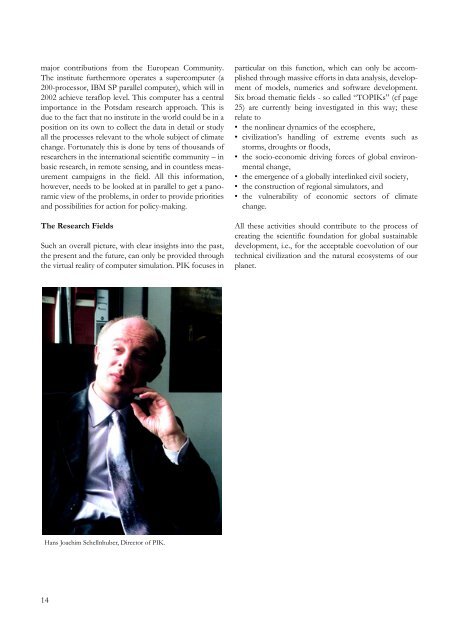PIK Biennial Report 2000-2001 - Potsdam Institute for Climate ...
PIK Biennial Report 2000-2001 - Potsdam Institute for Climate ...
PIK Biennial Report 2000-2001 - Potsdam Institute for Climate ...
Create successful ePaper yourself
Turn your PDF publications into a flip-book with our unique Google optimized e-Paper software.
major contributions from the European Community.<br />
The institute furthermore operates a supercomputer (a<br />
200-processor, IBM SP parallel computer), which will in<br />
2002 achieve teraflop level. This computer has a central<br />
importance in the <strong>Potsdam</strong> research approach. This is<br />
due to the fact that no institute in the world could be in a<br />
position on its own to collect the data in detail or study<br />
all the processes relevant to the whole subject of climate<br />
change. Fortunately this is done by tens of thousands of<br />
researchers in the international scientific community – in<br />
basic research, in remote sensing, and in countless measurement<br />
campaigns in the field. All this in<strong>for</strong>mation,<br />
however, needs to be looked at in parallel to get a panoramic<br />
view of the problems, in order to provide priorities<br />
and possibilities <strong>for</strong> action <strong>for</strong> policy-making.<br />
The Research Fields<br />
Such an overall picture, with clear insights into the past,<br />
the present and the future, can only be provided through<br />
the virtual reality of computer simulation. <strong>PIK</strong> focuses in<br />
Hans Joachim Schellnhuber, Director of <strong>PIK</strong>.<br />
14<br />
particular on this function, which can only be accomplished<br />
through massive ef<strong>for</strong>ts in data analysis, development<br />
of models, numerics and software development.<br />
Six broad thematic fields - so called “TO<strong>PIK</strong>s” (cf page<br />
25) are currently being investigated in this way; these<br />
relate to<br />
• the nonlinear dynamics of the ecosphere,<br />
• civilization’s handling of extreme events such as<br />
storms, droughts or floods,<br />
• the socio-economic driving <strong>for</strong>ces of global environmental<br />
change,<br />
• the emergence of a globally interlinked civil society,<br />
• the construction of regional simulators, and<br />
• the vulnerability of economic sectors of climate<br />
change.<br />
All these activities should contribute to the process of<br />
creating the scientific foundation <strong>for</strong> global sustainable<br />
development, i.e., <strong>for</strong> the acceptable coevolution of our<br />
technical civilization and the natural ecosystems of our<br />
planet.

















